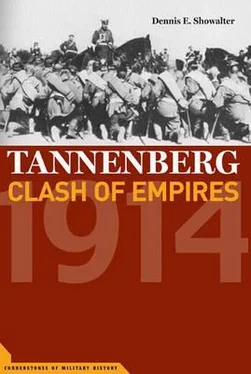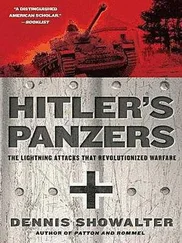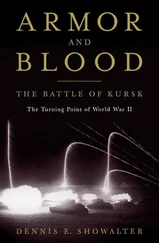These formidable forces were not projected to remain obligingly in place. The Russians had become sufficiently aware of German intentions to have altered their own. Rather than holding forward positions, their main armies now expected to retreat eastward, drawing their enemies after them. Waldersee’s initial response was a strategy of hot pursuit, with one German army attacking south into Russian Poland towards the Narew River, and another, smaller force advancing east across the Niemen River, on towards Kovno and Vilna. The new plan was risky at best, involving as it did movement in diverging directions against superior forces. It left almost no margin for human error or acts of God. In particular, Waldersee fretted about the possible impact of weather conditions on his projected offensive. Mud would slow the German infantry. It would immobilize the artillery whose firepower was regarded as an indispensable counterweight to Russian numerical superiority. By the end of his term in offfice Waldersee was even suggesting that should war begin during the wet season, Germany might be better advised to reduce its forces in the east in favor of the west until the weather changed. The rain clouds on the chief of staff’s horizon foreshadowed a basic change in Germany’s plans for the contingency of a two-front war. 41
Meanwhile, Russian relations with France steadily improved in the financial and military spheres. French bankers, eager to take Germany’s place exploiting the Russian market, negotiated in the summer and fall of 1888 a major conversion loan giving Russian credit a much-needed boost. The respective general staffs were also beginning a series of systematic exchanges. Widely publicized improvements in French organization, armament, and training during the 1880s did not go unnoticed in a Russia increasingly dubious of Germany’s probable attitudes in any European conflict. French generals for their part were all too aware of the enduring weaknesses of even their revamped military system. A Russian connection seemed to promise a quick fix, as opposed to dreary efforts to overhaul the army in the face of successive governments unable to pursue any policy over a long term. 42
Bismarck’s resignation on March 18, 1890, marked a watershed in German-Russian relations. The Reinsurance Treaty expired in June. Kaiser William II, logically enough, turned over the negotiations for its renewal to his new chancellor. Leo von Caprivi had no experience in foreign affairs. He had never even seen the texts of the treaty—hardly the best preparation for dealing with Holstein and his allies in the foreign office, who immediately sought to change the kaiser’s mind. They described the Reinsurance Treaty as conflicting with Germany’s other agreements, above all the Austrian alliance. Bismarck, the critics asserted, had been able to keep his complicated diplomacy alive because he was Bismarck. His reputation was such that even his follies were taken for wisdom. No successor could expect to have anything like the same status—or if it came to that, the same mind-set, with its enthusiasm for keeping a half-dozen balls in the air simultaneously. Clear-cut, unmistakable policies were preferable for a new administration under a young ruler.
Caprivi knew his own limitations. He was reluctant to assume Bismarck’s mantle and risk keeping apparently conflicting commitments to five powers at once—particularly in the context of the domestic conflicts that had been the immediate cause of Bismarck’s downfall and now demanded prompt attention. Responding to the overwhelming advice of his counsellors, William informed Giers that the recent changes in the government impelled Germany to avoid far-reaching commitments, at least temporarily. The Reinsurance Treaty would therefore not be renewed, but Russia could remain assured of Germany’s friendship and good offices. 43
Giers, shocked and upset, did everything in his power to change William’s mind. His desperation was enhanced by his isolation. Russia’s current chief of staff argued that the Congress of Berlin should have been lesson enough that Russia’s most dangerous enemy was not the one who fought her directly, but the one who awaited her weakening to dictate terms of peace.
A government’s policy is not always best evaluated by the opinion of its generals. But in March, 1892, Tsar Alexander suggested to a shocked Giers that a major order of Russia’s business in any future war would be to correct the error of German unification by breaking up the Reich into a number of small, weak states. Such attitudes, expressed not in journalistic or academic circles, but at the highest policy-making level, suggest that Germany was not exactly abandoning a willing partner—unless “willing” be interpreted as an equal desire to embrace or to annihilate the object of one’s affections. 44
Nonrenewal of the Reinsurance Treaty was not an overt step towards considering alliances in terms of their value in preparing for war, as opposed to sustaining peace. 45Holstein warned consistently against fatally alienating Russia at the wrong time by challenging her too sharply in a specific situation. Better by far to contain her through a structure functioning without Germany’s direct intervention. Rejection of the Reinsurance Treaty had been a necessary taste of the stick. Now, Holstein argued, it was time for carrots—trade agreements, political concessions, perhaps even a new treaty. But all must take place within the status quo. 46
Russia was in no position to issue direct challenges to any of the great powers. Her sponsorship of the Hague disarmament conference of 1899 reflected more a general consensus of the state’s military backwardness than an altruistic concern for international order. Russian military appropriations had the highest growth rate of any European power during the 1890s. After 1892 Russia consistently outspent France; after 1894 Germany too fell behind the tsar’s empire. But though Russia did move increasingly toward self-sufficiency in arms production, on the whole the amount of security purchased did not match the actual outlay of rubles. This reflected less internal inefficiency and corruption than the sheer size of the Russian military establishment—almost a million men during the 1890s, as opposed to the half-million or so kept with the colors by France and Germany. Russia’s extensive frontiers, the lengthy period of active service considered necessary to train peasant conscripts for modern war, and the slow mobilization imposed by an underdeveloped transportation network combined to generate a conviction that Russia needed the largest peacetime army she could possibly support. This in turn meant more money spent on maintaining the structure than improving it. 47
It was scarcely surprising in this context that Russian relations with Germany remained if not consistently warm, at least generally harmonious. French capital might dominate the official money market, but German investment in railroads and industrial enterprises steadily increased. German consumer goods made headway everywhere in Russian markets. Periodic vitriolic outbursts from Moscow or St. Petersburg over the inequities of the economic relationship were by this time familiar enough to be overridden. Where it counted the governments were well able to cooperate. 48
Nor was Holstein’s conviction that Imperial Russia and Republican France could sustain anything but the most fragile relationship directly disproved by the course of events. The first official French references to an “alliance” with Russia were made only in 1895. Not until 1897 would a Russian tsar acknowledge the treaty in public—and then it was Nicholas II, who in 1894 succeeded a father never proud of his French connection.
The new Russo-German relationship represented a significant departure from the direct influence Bismarck consistently sought to exercise. But restraints can be no less binding for being relatively loose. The possibilities of integrating Russia into a flexible network of diplomatic relationships seemed enhanced as France’s moderate attitude suggested the survival, or perhaps the rebirth, of that Concert of Europe Bismarck had done so much to demolish. Holstein and his colleagues in the foreign office were by no means hostile to the concept. A Europe subdivided into rigid alliance systems offered too little scope for the exercise of the diplomatic talents on which they prided themselves. Inflexibility bade fair to neutralize the economic and military strength, the geographic position, and not least the mixed form of government that, in the minds of Germany’s leaders, gave her such advantages as mediator and pivot point of an open international order. As early as 1895 Holstein asserted that “the Russians will need us before we will need them.” 49Germany could safely afford to wait for her eastern neighbor while preserving as far as possible a free hand towards the rest of the world.
Читать дальше












